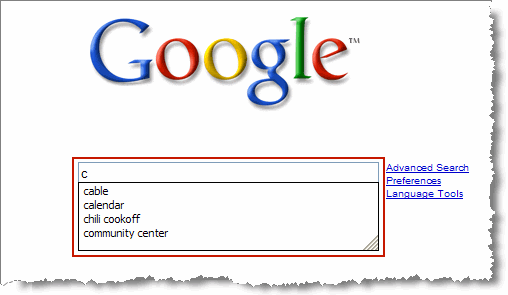CNet asks "Is Google's user interface outdated?" The DOS C: prompt was displaced by graphical windows. Ironically, Google has displaced cluttered windows with a box that resembles DOS.
We have usage questions. Is Google a search engine? Or has it displaced the browser address box? How are millions really using Google?

Users type and search. What are they typing?
- About 25% of users type the website, domain, or partial name. For example, the top keywords for Facebook are facebook, facebook.com, www.facebook.com, and face book. A large percentage of users no longer use the address bar or bookmark sites.
- Type ticker symbols and Google takes you to the financial data for a company.
- Type an address and Google assumes a map search.
- Type an area or zip code; Google returns a map.
- Type 'define:word'; Google becomes a dictionary.
Does this account for one third or more of Google's use?
Replacing the Yahoo Directory
Yahoo started with a directory of web sites. Publishers submitted domain names by category. As the lists grew, Yahoo scrambled to create order.
For the most common keywords, Google has become the directory. Using the Google system that ranks entries based on cross-links, these keywords produce essentially the old Yahoo directory with relatively static choices. Google's ranking system favors historic links, thus the content does not change quickly.
Google has enhanced the directory with many features.
- Relevant photos and videos have been integrated with the search results.
- Moving toward the semantic web, lists of phrases that include the keyword appear at the bottom of these pages. This is similar to Yahoo's efforts to group related subdirectories as new pages.
- For timely content, the news search only shows recent content. The content is still weighted to favor brands with long history and legacy cross-links.
- Book, blog, and scholar search further segment the directory of relevant sites.
As a blog, the Long Tail has little chance of becoming visible in the top pages of the Google's directory.
Successful search terms can be categorized as 'flypaper'. These unique combinations of names, trademarks, and other terms drive readers to us. Thousands of search terms each contribute a few hits; as opposed to one or two search terms that account for the majority of hits.
Flypaper accounts for the vast majority of search visitors.
Contextual Search
Google has been promoted as the intelligent search that contextually match searchers with content. After eliminating it's value as an Internet portal, Yahoo directory replacement, and flypaper tsunami - what percentage of the use is truly intelligent search based on context?
Analyze your data. What has been your experience?
Google: Okay To Be Evil Sometimes
Is Google done with its famous motto, "Don't be evil?" TechCrunch's Michel Arrington cites remarks by Google star Marissa Mayer in Australia that suggest that even Google is getting sick of this albatross:
Last week, however, Google's Marissa Mayer said 'It really wasn't like an elected, ordained motto' during an interview in Australia, adding 'I think that Don't Be Evil' is a very easy thing to point at when you see Google doing something that you personally don't like; it's a very easy thing to point out so it does get targeted a lot.'

No comments:
Post a Comment
Comments accepted immediately, but moderated.